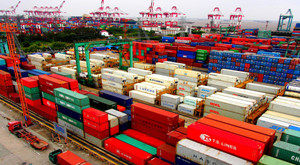China's foreign trade weathers storm of fluctuation
Xinhua, December 26, 2013 Adjust font size:
Bright side
While a challenge to trade, yuan appreciation opens a time window for global expansion. China's overseas investment may soon surpass the foreign direct investment (FDI) it attracts.
According to the MOC, Chinese investors splashed out money on 4,522 companies in 156 countries and regions in the first 11 months of 2013. Non-financial direct investment hit $80.24 billion, up 28 percent year-on-year, exceeding the total of $77.2 billion in 2012.
Actual use of foreign capital from January to November was $105.5 billion, increasing 5.48 percent from the previous year, with 20,434 new foreign funded enterprises established, 9.19 percent fewer than last year.
The MOC issued a new foreign investment guide in late December, covering political, economic and social backgrounds in 165 countries and regions. The fifth edition since 2009 should help Chinese investors to reduce risk. The recent economic conference also decided to simplify approval for investment overseas.
During another conference in south China's Guangzhou in late December, Justin Yifu Lin, former senior vice president and chief economist of the World Bank, suggested that Africa will be a prefect receiver of China's unwanted labor-intensive capacity, with its advantage of cheap labor.
"China's transformation from labor intensive industries to capital and technology intensive industries will bring opportunities for countries with lower wave levels to start their modernization," Lin added.
"Direct investment from Chinese companies will help underdeveloped regions cope with environmental problems and poor infrastructure, while including them in the global industrial chain."
While labor intensive industries focus on emerging markets in Asia and Africa, high-end manufacturers are more interested in developed markets.
China's investment in the United States leapt 232.2 percent in the first 11 months of this year.
Francisco J. Sanchez, a former US undersecretary of commerce, said at the same occasion that the United States could also become the bridgehead for Chinese companies' global expansion.
Sanchez added that if costs of labor, gas and electricity keep decreasing in the United States, manufacturing labor cost will be almost the lowest among developed countries.
Chinese enterprises that invest in the United States will have bright futures, he said.


